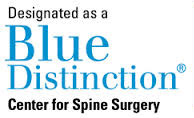3 Habits for a Healthy Spine
Trouble with your spine can lead to pain in your neck, lower back, and even arms or legs. Keeping your spine healthy can go a long way to help prevent this chronic pain. Here are some easy habits for a healthy spine.

Tips to Keep Your Spine Healthy
Posture, Posture, Posture
You’ll see this theme throughout the articles here on Saratoga Spine. That’s because posture can have such a huge impact on the spine.
There is a natural curvature of the spine. Altering this curvature for long periods of time puts stress on the spine. This can result in damage to the soft tissue (ie: discs, ligaments) of the spine and possibly lead to pain.
Remembering good posture whether you’re sitting, standing, driving, or using your phone can help you maintain a healthy spine.
Regular Exercise
One of the spine’s primary functions is to provide support for the body. However, our muscles also help with this. Keeping our core muscles healthy ensure that they do their job. If our muscles weaken, our spine bears more of the burden of holding up our body. The additional burden on the spine can lead to soft tissue damage and pain.
Getting regular exercise can help keep our muscles active and strong.
Walking is a great form of exercise. Start slowly and try to work up to an hour per day to keep a healthy spine.
Take Breaks
If your activity involves a repeated motion or a position your body isn’t used to, take frequent breaks. The continuous bending and twisting of raking leaves, lifting and moving boxes, bending over while gardening, or bending and lifting to shovel snow can wreak havoc on your spine.
If you’re doing an activity that involves an unusual motion, make sure you’re stopping and giving your spine time to rest.
Habits for a Healthy Spine
Remembering these 3 simple habits for a healthy spine can help minimize your chances of back and neck pain.
References
